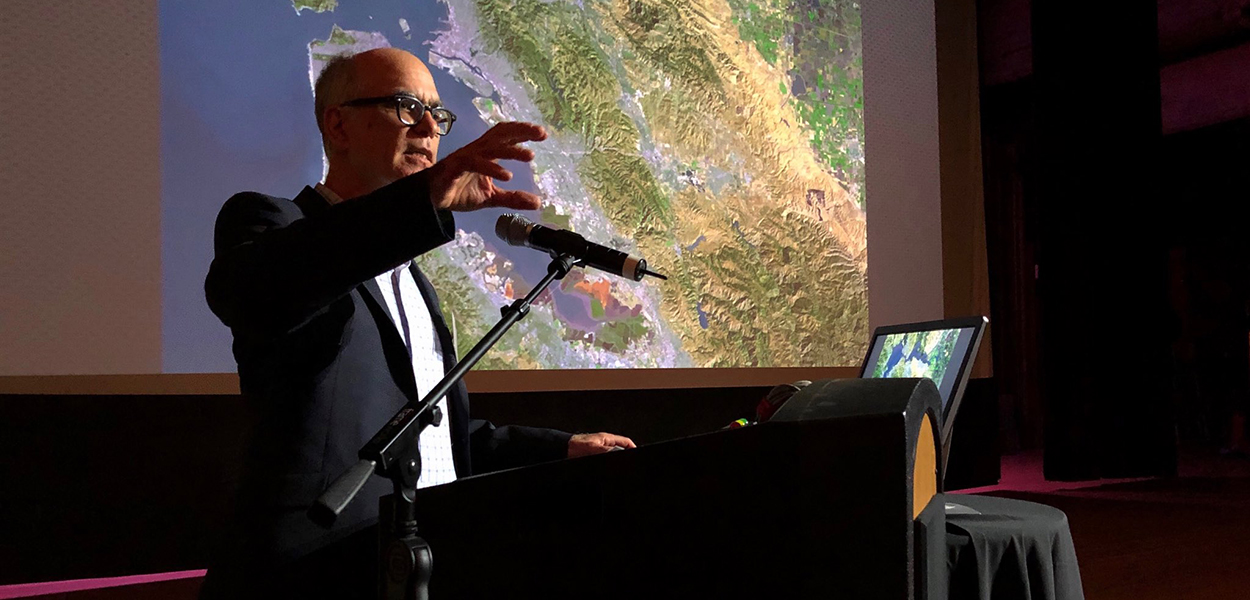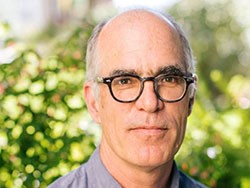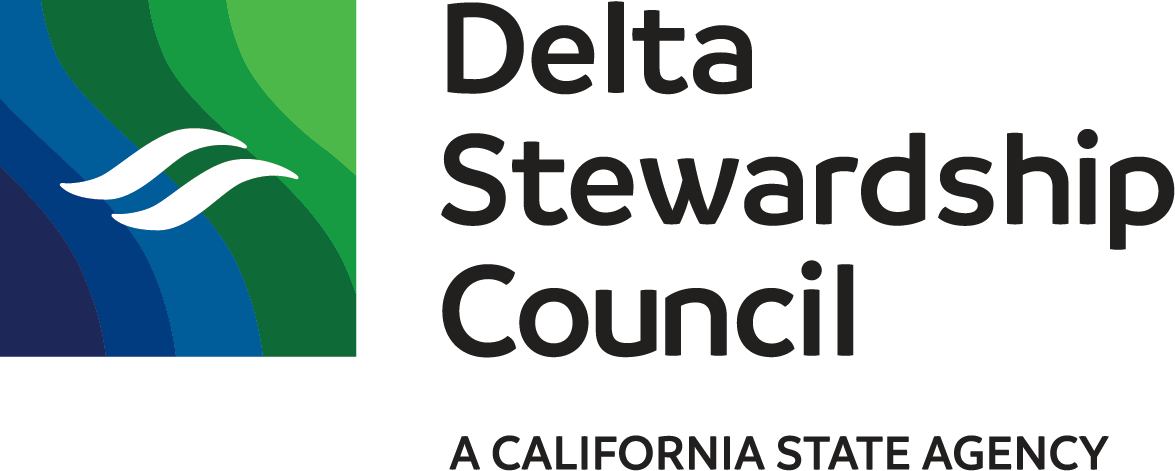
Delta Lead Scientist Dr. John Callaway welcoming environmental decision-makers, managers, and scientists to a “Zooming Out to the Full System” session at the 2019 State of the San Francisco Estuary Conference in Oakland, Calif. Photo: Delta Stewardship Council
How Far We’ve Come: A Reflection by Outgoing Delta Lead Scientist Dr. John Callaway
August 17, 2020
By Dr. John Callaway
As my three years as Delta lead scientist come to a close, I must say that I feel incredibly lucky to have had the chance to work in the Sacramento-San Joaquin Delta and to learn from such an outstanding group of people who are committed to improving the region: the Delta Stewardship Council and Delta Science Program; the Delta Independent Science Board (Delta ISB); the Delta Plan Interagency Implementation Committee (DPIIC) member agencies; and all of the non-governmental entities, academia, and stakeholders involved in Delta science and management. Despite the ongoing challenges that remain in the Delta, we have made progress over the last three years. I say we because it’s the exceptional staff and broader Delta community who have made such progress possible. Whether it be through collaborating, funding science, integrating social science, embarking on climate change initiatives, conducting independent peer reviews, or communicating scientific findings, oh how far we’ve come.
Increased Collaboration
While it may seem obvious, it still needs to be said: Collaboration is the key to future progress, especially given the Delta’s current fractious condition. There are no simple answers to the region’s “wicked problems,” but working collaboratively on science is the only way we will make meaningful advances. Recent progress toward this essential One Delta, One Science mindset - or better yet, the aspiration of One Estuary, One Science - includes broad engagement on:
- A Framework - Collaborative development and implementation of the 2019 update to the Delta Science Plan;
- Priorities - Ongoing update of the Science Action Agenda, which by popular demand will revolve around clear management questions; and
- Financial Resources & Clear Roles and Responsibilities - DPIIC Science Funding and Governance Initiative, including the FY 2018-2019 Delta Crosscut Budget Report.
These efforts and more have been carefully framed to incorporate diverse engagement to ensure the result is management-relevant science.
Funding Science
In addition to the DPIIC Science Funding and Governance Initiative, which identifies clear steps to both make science funding in the Delta science enterprise more efficient and increase overall science funding, collaboration has been vital to funding science, including a 2019 joint solicitation with the California Department of Fish and Wildlife and the U.S. Bureau of Reclamation (Reclamation) that awarded $17 million to Delta-focused scientific studies targeting key gaps in knowledge. Going forward, the Delta Science Program plans for regular competitive research solicitations every two years, with opportunities for Delta science fellows in the alternate years. Funding for both general solicitations and fellowships continues to be a collaborative effort, with participation from Reclamation and the State Water Contractors; the Delta Science Program is interested in growing broader support for science funding.
Engaging Social Science
The call for improved engagement with social science also requires increased collaboration. This call is not unique to the Delta and is being grappled with in systems across the United States. Natural sciences alone will not solve the problems we face when it comes to ecosystems or water supply reliability. We also need the help of the perspectives and data that sociology, anthropology, economics, and other social sciences bring to the table The Delta science enterprise has taken significant steps toward better integration of in-region social science through:
- Development of the Delta Social Science Task Force;
- Creation of new social science positions;
- Appointment of incoming Delta ISB members with social science expertise and awareness; and
- Engagement in dialogue around regional science governance.
It is encouraging to see greater traction to improve our understanding of people in the Delta, and I look forward to seeing how this evolves in the coming years.
Climate Change
Over the last few years, there has been growing acknowledgment around the importance of understanding the impacts of climate change in the Delta and Suisun Marsh. The Delta ISB has been instrumental in pushing us all to proactively engage on climate change in the region. The Council’s Delta Adapts initiative has also raised awareness of the issue. As with social science, much remains to be done, but the development of a Science Needs Assessment, coordinated by the Delta ISB and the DPIIC, will be a major step for the community to coalesce around these issues and to set an agenda for addressing science and management issues related to rapid environmental change.
Conducting Independent Peer Review
One of the major contributions of the Delta Science Program over the years has been raising awareness of the value of independent peer review to maintain the integrity and quality of the science that is funded and completed in the region. The Delta ISB has consistently provided valuable input for the Delta science community through its reviews, and it is extremely satisfying to see the exceptional incoming members who will join the Delta ISB in September 2020. In addition to Delta ISB reviews, the work of individual review and advisory panels facilitated by the Delta Science Program have been essential to maintaining the rigor, quality, and relevance of Delta science efforts. Peer review should be incorporated into future Delta science efforts as widely as possible.
Science Communication
I will finish by saying that science communication is something that we all need to commit to improving. No matter how much science we do, its broader value will not be recognized unless we can effectively communicate the importance to a wide audience of decision-makers, managers, stakeholders, and more. This is an ongoing challenge as we all are bombarded by more and more information coming from different sectors via various types of media, and it’s a challenge that requires resources and careful thought to effectively address.
While my term as Delta lead scientist has come to an end, I look forward to staying connected to Delta issues through my work at the University of San Francisco, and I’m unwaveringly sure that Dr. Laurel Larsen will do an exceptional job as the next Delta lead scientist. I hope to remain in touch with all of you in the Delta science and management community. I’ll just be a bit downstream for the coming years where I’ll continue working towards One Estuary, One Science.
About the Author

About outgoing Delta Lead Scientist Dr. John Callaway
Dr. Callaway is the outgoing lead scientist for the Delta Stewardship Council and the Delta Science Program. An internationally recognized expert in wetland restoration, specifically wetland plant ecology and sediment dynamics, he will be teaching this fall at the University of San Francisco, where he also is directing the Environmental Management Master’s Program. He has served on a number of advisory panels on wetland management issues including for projects in Louisiana, Venice Lagoon (Italy), San Francisco Bay, and Southern California. Dr. Callaway holds a bachelor’s degree from UC Berkeley and a master’s degree from San Francisco State University, both in biology. He earned a Ph.D. in oceanography and coastal sciences from Louisiana State University. When he is not working, Dr. Callaway and his wife enjoy biking, hiking, and canoeing throughout California.

